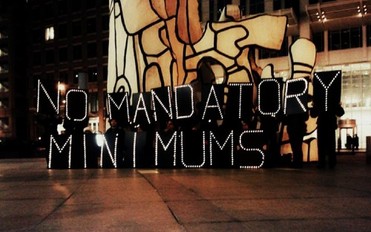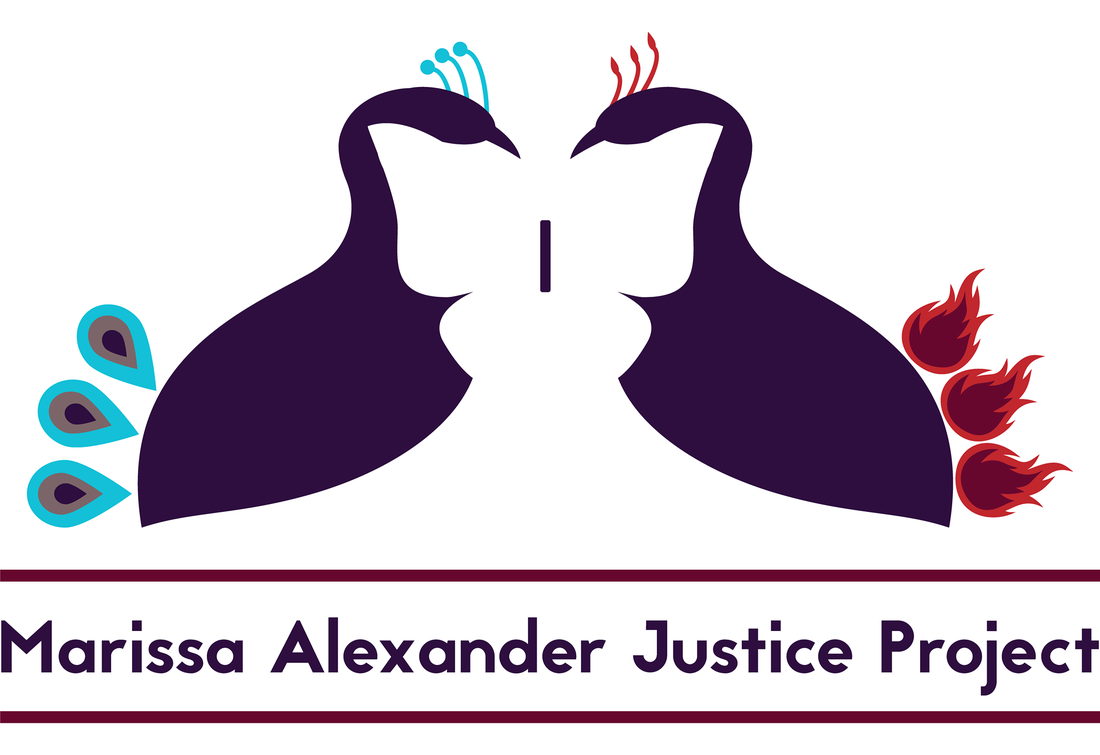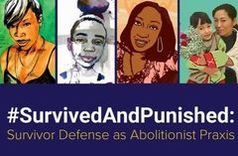 Photo by Kelly Hayes, Direct Action in Chicago, 12/2/13
Photo by Kelly Hayes, Direct Action in Chicago, 12/2/13
REPEAL MANDATORY MINIMUMS:
A Racial Justice & Domestic Violence Issue
A Free Marissa Now Campaign Statement
(Download as pdf.)
WHO IS MARISSA ALEXANDER?
A DEEPLY FLAWED SYSTEM OUT OF CONTROL: 10-20-LIFE MANDATORY MINIMUMS IN FLORIDA
MANDATORY MINIMUM SENTENCING IS A DOMESTIC VIOLENCE ISSUE
RECOMMENDATIONS
-- Arrested Justice: Black Women, Violence, and America’s Prison Nation
NOTES
(1) Beth E. Richie. Compelled to Crime: The Gender Entrapment of Battered Black Women (New York: Routledge Press, 1996).
(2) Marti Tamm Loring & Pati Beaudoin. Battered Women As Coerced Victim-Perpetrators,2J. Emotional Abuse 3, at 13 (2000).
A Racial Justice & Domestic Violence Issue
A Free Marissa Now Campaign Statement
(Download as pdf.)
WHO IS MARISSA ALEXANDER?
- Marissa Alexander is a proud African American mother of three, a loving daughter and sister, she has earned an MBA, she’s a woman of faith, and she’s a survivor of domestic violence. In 2012, Ms. Alexander was sentenced to 20 years in the Florida criminal correctional system for defending herself from her abusive estranged husband.
- Ms. Alexander, a licensed and trained gun owner, fired a single warning shot upwards into a wall to halt her abusive partner during a life-threatening beating. Despite causing no injuries and having no previous criminal record, and despite the fact that Florida’s self-defense law includes the right to “Stand Your Ground,” she was charged with aggravated assault. Her sentence was set at 20 years due to Florida’s 10-20-Life mandatory minimum sentencing laws. Judge James Daniel who presided over Marissa’s trial said that, despite the calls for sentence leniency, sentencing power was "out of my hands,” stating, “The Legislature has not given me the discretion to do what the family and many others have asked me to do."
- Ms. Alexander successfully appealed the 2012 verdict and faces a new trial. State Prosecutor Angela Corey's office stated that, if Alexander is found guilty in the upcoming trial, they will seek three 20 year sentences to be served by Alexander consecutively rather than concurrently, effectively tripling the original sentence to a mandatory minimum of 60 years.
A DEEPLY FLAWED SYSTEM OUT OF CONTROL: 10-20-LIFE MANDATORY MINIMUMS IN FLORIDA
- Attorney General Eric Holder recently called mandatory minimums “draconian” and the cause of “shameful” racial disparities in US prisons.
- Mandatory minimums have significantly increased existing racial disparities in US prisons and have been a core contributor to the US prison crisis. Black women are 2.8 times more likely than white women to be in prison, and black men are incarcerated at 6.4 times the rate of white men.
- Passed in 1999, the 10-20-Life mandatory minimum Florida statute has had a devastating impact on too many lives and is not working the way the law’s supporters intended. Republican Victor Crist, who wrote the statute when he served in the Florida House, said lawmakers never meant for 10-20-Life to impact cases like Marissa Alexander’s.
- Greg Newburn, Florida project director for Families Against Mandatory Minimums, said, "Here's the thing about the 10-20-Life law: The people who actually think they're innocent of the crime, they roll the dice and take their chances, and they get the really harsh prison sentences. The people who think they are actually guilty of the crime take the plea deal and get out (of jail) quickly. So [10-20-Life] certainly isn't working the way it's intended."
- US Congresswoman Corinne Brown of Florida also expressed urgent concern about Ms. Alexander’s extreme sentence, noting “Abused women like Marissa…need support and counseling so they don’t find themselves in these situations to begin with. Arresting and prosecuting them when no one was hurt does not help anyone. Even worse, mandatory minimum sentences just make the system appear arbitrary and cruel.”
MANDATORY MINIMUM SENTENCING IS A DOMESTIC VIOLENCE ISSUE
- The connection between domestic violence and mandatory minimums requires urgent attention.
- 85-90% of women in prison have a history of being victims of violence prior to their incarceration, including domestic violence, sexual violence, and child abuse. Violence perpetrated against women and girls can put them at risk for incarceration because their survival strategies are often criminalized. A study of women incarcerated in New York’s Rikers Island found that most of the domestic violence survivors interviewed reported engaging in illegal activity in response to experiences of abuse, the threat of violence, or coercion by a male partner.(1) Another study found that, of 525 abused women at a mental health center who had committed at least one crime, nearly half had been coerced into committing crimes by their batterers as “part of a structural sequence of actions in a climate of terror and diminished, violated sense of self.”(2) Rita Smith, the executive director of the National Coalition Against Domestic Violence asserts that, “Most battered women who kill in self-defense end up in prison. There is a well-documented bias against women [in these cases].” From being coerced into criminal activity by their abusers to fighting back to defend their lives or their children’s lives, survivors of domestic violence can find themselves trapped between the danger of sometimes life-threatening violence and the risk of spending the rest of their lives in prison.
- Yet, mandatory minimums have made it impossible for the context of domestic violence to be taken into consideration when survivors are found guilty of certain crimes. The judge who presided over Marissa Alexander’s case demonstrated this perfectly when he asserted that sentencing was “out of my hands,” preventing him from applying the mitigating circumstance of domestic violence to deciding her sentence. Another high profile example is Kemba Smith, who received a 25 year sentence after being coerced to participate in her abuser’s drug activities and who is only free today because President Bill Clinton pardoned her in 2000.
- Marissa Alexander should never have been charged for defending her life, much less prosecuted, convicted, and sentenced to twenty years in prison. Ms. Alexander’s case is one of many that reveal how black women and other marginalized people are especially likely to be criminalized while trying to navigate and survive the conditions of violence in their lives. The courts should support victims of domestic violence, not compound the abuse they experience. Mandatory minimums, and the criminalization of survivors in general, make police, courts, and prisons complicit in domestic violence, creating institutional reinforcement for the ongoing targeting and punishing of survivors of violence.
RECOMMENDATIONS
- Federal and state mandatory minimum laws must be repealed. Evidence shows that they don’t accomplish a decrease in crime, but they do help warehouse thousands of people in overcrowded prisons, aggravate existing racial disparities in prisons, and compound the abuse experienced by criminalized survivors of domestic violence. In addition, privatized prisons that have a profit motive in increasing the number of incarcerated people must be abolished.
- Until mandatory minimum laws are eliminated, create an exception to mandatory minimums for cases that include domestic violence and self defense. Judicial discretion is needed in cases that include complexities not anticipated by mandatory minimum statutes. An example of this kind of legislation is New York’s Domestic Violence Survivors Justice Act (DVSJA), written by the Coalition for Women Prisoners and being considered by the New York State legislature.
- Provide people who are currently serving mandatory minimum sentences the opportunity to apply for a reduction in their sentences, including alternatives to incarceration. An example is the DVSJA which, if passed, would allow incarcerated survivors to apply to the courts for resentencing. Also, support legislation that allows incarcerated survivors of abuse to petition for their freedom, such as California’s “Sin by Silence” law.
- Mandate training for all judges, prosecutors, law enforcement and dispatchers on domestic violence dynamics and their state laws; the intersection of domestic violence, race, gender, and class; and training on cultural competency, diversity, and institutional racism. Ensure judges are trained on expert witness and aware of domestic violence services in their jurisdictions, and build working relationships with them in concrete ways.
- Expand alternatives and support, not criminalization for all survivors of domestic and sexual violence. Mass incarceration exacerbates the problem of domestic violence for survivors who should be supported, not prosecuted. Communities must support truly transformative community-based responses to violence that prioritize survivors’ safety and self-determination, support abusive people to account for and change their behavior, and transform the social conditions that help sustain violence. For women and all survivors to lead safe, independent lives, legislators must prioritize funding for jobs, housing, homeless shelters, education, childcare, counseling, and other human services.
- Key research by Dr. Beth E. Richie, University of Illinois, Chicago:
-- Arrested Justice: Black Women, Violence, and America’s Prison Nation
- The film, Crime after Crime: The Battle to Free Debbie Peagler
- Contact the Free Marissa Now campaign at FreeMarissaNow@gmail.com. Learn more about the campaign at freemarissanow.org and follow us on facebook, twitter, and tumblr at "freemarissanow"
NOTES
(1) Beth E. Richie. Compelled to Crime: The Gender Entrapment of Battered Black Women (New York: Routledge Press, 1996).
(2) Marti Tamm Loring & Pati Beaudoin. Battered Women As Coerced Victim-Perpetrators,2J. Emotional Abuse 3, at 13 (2000).


